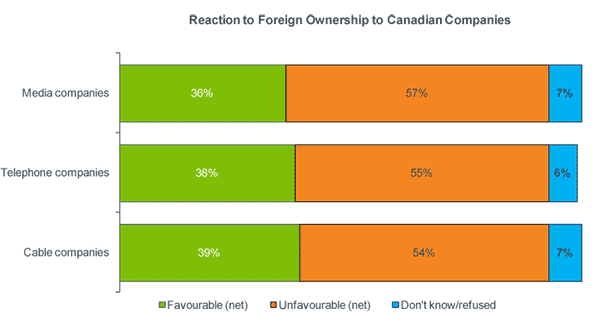Foreign Ownership of Canadian Broadcasting and Telephone Companies
New Harris/Decima survey says the majority of Canadians agree that it's important the Canadian government work to maintain and build a culture and identity distinct from the United States.
Conducted by Harris/Decima for Friends of Canadian Broadcasting, ACTRA and the Communications, Energy and Paperworks Union of Canada
The majority of Canadians agree that it's important the Canadian government work to maintain and build a culture and identity distinct from the United States (81%). Women are more likely than men to agree with this statement (84% vs. 78%). Conservative voters are less likely to agree that it's important for Canada to maintain a distinct identity from the United States (77%).
Many Canadians have an unfavourable reaction to foreign ownership of telephone (55%), cable (54%), and media companies (57%).
 There are various demographic differences related to the foreign ownership of telephone companies in Canada:
There are various demographic differences related to the foreign ownership of telephone companies in Canada:
- Women are more likely than men to have an unfavourable reaction (62% vs. 48%).
- As age increases, so does the likelihood of unfavourable reactions.
- Those with a household income less than $40k are also more likely to have a negative reaction (64%).
Groups who react unfavourable to the foreign ownership of telephone companies are also more likely to feel the same about cable companies:
- Women are more likely than men to negatively react (60% vs. 48%).
- As age increases, the likelihood of an unfavourable reaction also increases.
- Again, those whose household income is less than $40k are more likely to react unfavourably (61%).
Other differences are found when comparing negative reactions to foreign ownership of media companies:
- Quebecers are least likely to have an unfavourable reaction (51%).
- NDP voters are significantly more likely to be unfavourable towards foreign ownership (70%).
- Women continue to be more likely than men to have a negative reaction (62% vs. 53%).
- While older Canadians are still more likely to react negatively to foreign ownership of media companies, there isn't as strong of a difference.
The majority of Canadians believe Canadian broadcasting and communication companies are too important for cultural and national security reasons to allow ownership and control by foreign companies (68%). Women are more likely than men to agree with this statement (74% vs. 61%). Older Canadians also believe Canadian broadcasting and communications companies are too important to allow foreign ownership. Interestingly, those whose household income is $100k or higher are least likely to believe these Canadian companies are too important to be owned by foreign companies (60%) and are more likely to indicate Canadian companies should be able to sell a majority interest to foreign companies (33%). Another interesting point is that Conservative voters are least likely to indicate Canadian broadcasting and communication companies are too important for foreign ownership (61%).
If foreign companies gained permission and acquired control of Canadian broadcasting and cable companies, half (48%) of Canadians would expect Canadian content on radio and TV to decrease, while one-third (36%) would expect it to remain the same. Regionally, Quebecers are more likely to think Canadian content will increase (23%) instead of decrease (37%). Men are more likely to think Canadian content will remain the same (41%), while women are more likely to think it will decrease (51%). Those with a household income less than $40k are more optimistic and think Canadian content would increase (19%), while those with a household income over $40k are more likely to think Canadian content would decrease (51%).
In the upcoming federal election, Canadians continue to be more likely to vote for a candidate who opposes foreign corporations owning more of Canada's broadcasting and telephone companies (64%). Regionally, Quebecers (71%) are most likely to oppose. Women are more likely than men to vote for a candidate who opposes this position (69% vs. 58%). NDP (77%) and BQ (81%) voters are also most likely to vote for candidates who oppose foreign ownership.
The Harris/Decima study was conducted by telephone with a representative sample of 2,019 Canadian women and men between March 31st and April 12th, 2010. A sample of this size has a margin of error of +/- 2.2 percent, 19 times in 20.
Harris/Decima is one of Canada's most established names in public opinion and market research, with a 25-year track record of innovation and client satisfaction. Today, they are among the largest full service marketing research organizations in Canada. Harris/Decima offers a full slate of custom and syndicated research services, including telephone and on-site interviewing, self-administered mail-back and on- line surveys, as well as qualitative one-on-one executive interviewing and focus groups. Harris/Decima conducts research on public and social policy, program evaluation, employee satisfaction, issue management, marketing, advertising and communications testing and evaluation for a wide range of clients in the public, private, and third party sectors.
